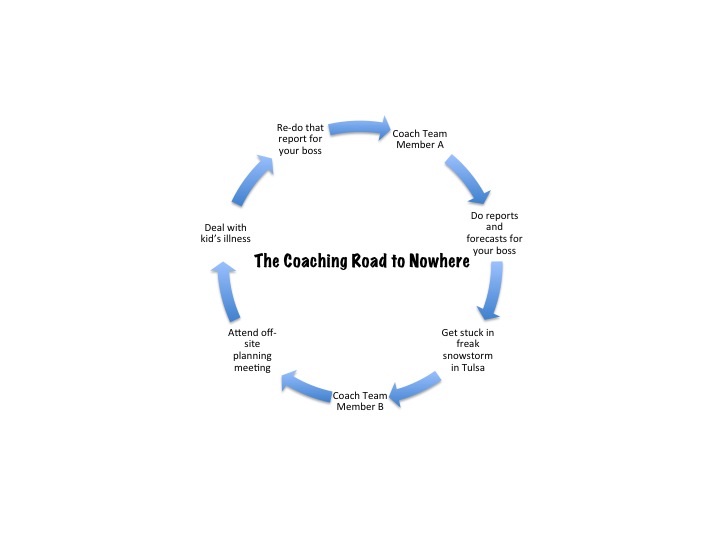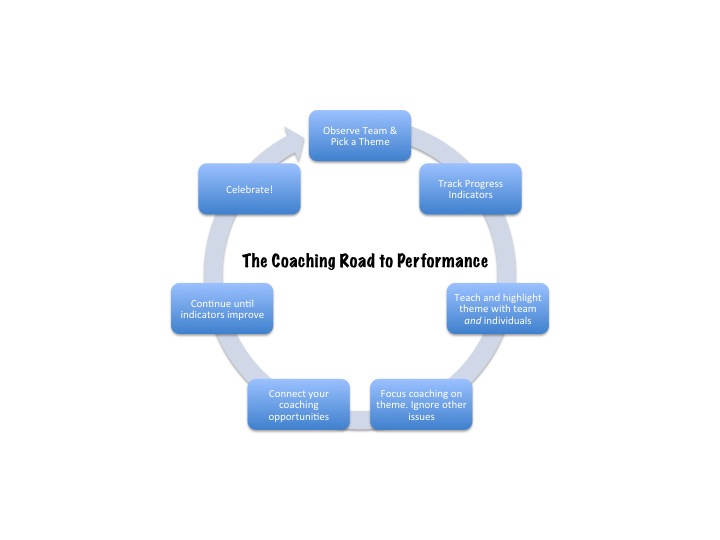We all know that developing the talent in our organizations is a fundamental role of leaders. Yes, yes we know that we should be adding to the bench strength of our organization constantly since one key to long-term growth is having enough talented, switched-on people available to turn ideas into action. We know we can't delegate the development of people to the HR department. It's their job to provide top-notch candidates and tools. It's our job to wield those tools with skill and dedication.
We even put our managers through mandatory training on how to coach people. And I'd bet you've been to quite a few of these sessions on coaching. You know the drill:
- Coaching is about observing someone else doing their job.
Your job as a coach is to focus on their behaviors instead of your judgement of their behaviors. And immediately after the observation is done you should offer your team member some feedback. And yes, yes, you probably even know that it's best if team members give themselves feedback before you offer yours so that they grow in their ability to self-correct when you're not around.You've heard all of this. You know it. And you probably know something else too...
Everything you just nodded your head to is solid. But it doesn't work. Here's why.
You'll work with Team Member A on Monday. You'll follow the four-step (or three-step or ten-step) coaching process you were taught in class. At the end of that coaching interaction, you'll move on. After spending Tuesday and Wednesday keeping corporate happy doing reports and forecasts - and getting stuck in the Tulsa airport during a freak snowstorm - you'll get another coaching opportunity on Thursday with Team Member B. Again, you'll coach your team member based on that one snapshot, following the recipe in the cookbook. You'll check that box and go home feeling like you've done your leadership bit.
This pattern goes on for a few weeks through a parade of events - off-sites, report writing, presentations to senior management, your kid's illness - until you find yourself watching Team Member A again several weeks later. You do the coaching drill again, check the box again, and go your merry way.
But if you stop long enough - maybe during your next flight delay - you know that things aren't really getting better. You're busy. You're following the coaching cookbook. But Team Member A's progress isn't all that obvious despite your efforts.
More disturbingly, despite your best efforts, the performance of the entire team isn't improving. You know that in the end, you won't be judged on how many coaching interactions you've had. You'll be judged on results. So you're tempted to blow coaching off entirely.
Coaching one team member, one situation at a time seems like the obvious way to begin. But if one coaching interaction doesn't connect to the next one - and if your team's performance as a whole isn't improving - then it's a waste of time. And that's because you're taught to do everything backwards. It's like you've just signed up to coach your kid's soccer team and they're getting hammered each week but you're spending most of your time helping Aidan learn to dribble. If the goal is better results for the team, coach the team, not just the individual.
Here's one way you can coach a team to better results over time:
- Observe the team as a whole. Don't be satisfied with one day of observation. Watch long enough that you're seeing the performance trends. Choose the trend that has the biggest impact or is the most fundamental. Say you lead a sales team. Maybe you notice that they're having a hard time getting appointments because they can't explain what your company does in a simple, credible way. That means they get fewer shots on goal and obviously fewer goals.
Find the behavioral key. Ask yourself, "What change in mindset and behavior would help us overcome this hurdle? How can we keep our promises to our customers better and deliver better results for our company?" Track business indicators that would tell you when the team is starting to improve in your selected focus area. In the case of our imaginary sales team, maybe we would track the ratio of calls we make to appointments we set. Bring people's attention to this ratio over and over. Start to teach and highlight that theme - improving our appointment ratio - repeatedly with the team, both in group settings and in individual conversations. Ignore other stuff. When observing individuals, watch everything but pay special attention to the aspects of their work that affect your thematic focus. You may even choose to ignore other coaching issues for the short term - like that annoying joke John tells to break the ice when he tries to close the sale - to help the group get traction. While it's difficult to ignore the other eight things you see in a coaching interaction, there's nothing like laser focus to get things moving. Note progress and areas for continued improvement as you observe each person so that you can connect what you see in each coaching interaction. It's powerful to say, "When I watched you try to get appointments a few weeks ago, I saw you struggle to articulate why the customer might want to meet with you. Today, I heard three crisp reasons - and I saw customers' eyes light up as a result!" Be relentless. Continue in this vein until the team makes solid progress on your focus area - as shown by the indicators you're tracking. Celebrate. Learn. Choose a new focus area. Repeat.I could leave you there, but I'd be doing something that really annoys me - giving you the cookbook answer without providing the underlying rationale that will help you morph the approach to work for you. So here's the rest of the meal. If you want to use the approach I outlined above, you need skills.
- You need to be a keen observer. Obviously, you have to be an astute watcher of your team members as they perform. But deeper than that, you have to be a student of the game - whether your game is sales, leadership, consulting, or something else. You have to know what good looks like and why good matters. You have to see nuance and subtlety instead of formulas.
You need to be an effective communicator. That means that you have to be expert at helping light bulbs go on. If your team members are giving you blank stares, it doesn't matter how brilliant your insights are. You have to think critically. It's no easy feat to sift through all of the potential areas of focus, find the vital ones, and link those focus areas to performance indicators.But don't stop at skill. You also need a different mindset. Great coaches don't come to their team at half-time and shout about the score. Even the dullest member of the team knows the score. It's there on the freaking scoreboard. Great coaches see their roles as helping teams unlock the secrets to performance.
Then go beyond mindset. Great coaches operate from a different motivation. They want to win, but their real buzz comes from seeing light bulbs go on and enjoying the success of others. Tap into that and you'll start coaching winners.
Our 2024 Coverage Needs You
It's Another Trump-Biden Showdown — And We Need Your Help
The Future Of Democracy Is At Stake
Our 2024 Coverage Needs You
Your Loyalty Means The World To Us
As Americans head to the polls in 2024, the very future of our country is at stake. At HuffPost, we believe that a free press is critical to creating well-informed voters. That's why our journalism is free for everyone, even though other newsrooms retreat behind expensive paywalls.
Our journalists will continue to cover the twists and turns during this historic presidential election. With your help, we'll bring you hard-hitting investigations, well-researched analysis and timely takes you can't find elsewhere. Reporting in this current political climate is a responsibility we do not take lightly, and we thank you for your support.
Contribute as little as $2 to keep our news free for all.
Can't afford to donate? Support HuffPost by creating a free account and log in while you read.
The 2024 election is heating up, and women's rights, health care, voting rights, and the very future of democracy are all at stake. Donald Trump will face Joe Biden in the most consequential vote of our time. And HuffPost will be there, covering every twist and turn. America's future hangs in the balance. Would you consider contributing to support our journalism and keep it free for all during this critical season?
HuffPost believes news should be accessible to everyone, regardless of their ability to pay for it. We rely on readers like you to help fund our work. Any contribution you can make — even as little as $2 — goes directly toward supporting the impactful journalism that we will continue to produce this year. Thank you for being part of our story.
Can't afford to donate? Support HuffPost by creating a free account and log in while you read.
It's official: Donald Trump will face Joe Biden this fall in the presidential election. As we face the most consequential presidential election of our time, HuffPost is committed to bringing you up-to-date, accurate news about the 2024 race. While other outlets have retreated behind paywalls, you can trust our news will stay free.
But we can't do it without your help. Reader funding is one of the key ways we support our newsroom. Would you consider making a donation to help fund our news during this critical time? Your contributions are vital to supporting a free press.
Contribute as little as $2 to keep our journalism free and accessible to all.
Can't afford to donate? Support HuffPost by creating a free account and log in while you read.
As Americans head to the polls in 2024, the very future of our country is at stake. At HuffPost, we believe that a free press is critical to creating well-informed voters. That's why our journalism is free for everyone, even though other newsrooms retreat behind expensive paywalls.
Our journalists will continue to cover the twists and turns during this historic presidential election. With your help, we'll bring you hard-hitting investigations, well-researched analysis and timely takes you can't find elsewhere. Reporting in this current political climate is a responsibility we do not take lightly, and we thank you for your support.
Contribute as little as $2 to keep our news free for all.
Can't afford to donate? Support HuffPost by creating a free account and log in while you read.
Dear HuffPost Reader
Thank you for your past contribution to HuffPost. We are sincerely grateful for readers like you who help us ensure that we can keep our journalism free for everyone.
The stakes are high this year, and our 2024 coverage could use continued support. Would you consider becoming a regular HuffPost contributor?
Dear HuffPost Reader
Thank you for your past contribution to HuffPost. We are sincerely grateful for readers like you who help us ensure that we can keep our journalism free for everyone.
The stakes are high this year, and our 2024 coverage could use continued support. If circumstances have changed since you last contributed, we hope you'll consider contributing to HuffPost once more.
Already contributed? Log in to hide these messages.


